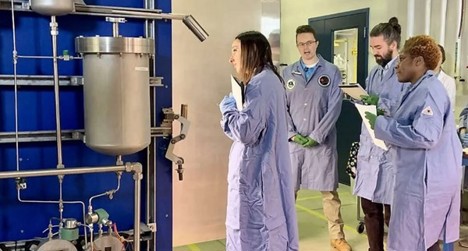
News
Business
Labour
News
Research
Trends
Student team aims to advance to next phase of Deep Space Food Challenge
The final grand prize winner will be announced in spring 2024 and will receive $380,000 in grant funding.
February 9, 2023 By the University of Guelph
 (Source: the University of Guelph)
(Source: the University of Guelph) Students from the University of Guelph’s Ontario Agricultural College are feeling optimistic their entry in the Canadian Space Agency’s (CSA) Deep Space Food Challenge will advance to Phase 3 of the multi-year contest.
Recently, the team met with CSA members in the Controlled Environment Systems Research Facility (CESRF) to unveil the system that could one day be used to grow food during lengthy space missions.
Called Canada GOOSE, or Growth Options for Outer Space Environments, the food-growing system is a self-contained, plant-growth chamber that uses advanced environmental control technology to grow vegetables, fruits, and mushrooms without soil, sunlight, or even fresh water. .
GOOSE student team leader Jared Stoochnoff, a post-doctoral researcher in the School of Environmental Sciences (SES), explained the system features calibrated LED light systems that mimic the sun and can match the needs of each crop.
“The temperature, carbon dioxide, and circulation within the growing chamber are carefully controlled using a low-wattage system that requires no more energy than a video gaming device,” he said.
Contest to drive advancements for more sustainable food production
Nearly fully self-sustaining, the system requires only a few hours of maintenance a week to yield as much as 150 kilograms of food a year.
The Deep Space Food Challenge was launched in 2021 by the CSA in partnership with Impact Canada to encourage the development of new technologies to produce food for future space missions. A similar challenge is underway in the U.S. with support from NASA.
The contest is part science fiction, imagining a world of long-term space missions in which astronauts would produce their own food, and partly based on the realities here on Earth, where there’s a growing need for more sustainable food production.
The University of Guelph team was one of 10 Canadian teams selected last year to present their prototypes to the CSA panel.
If selected next month to move to Phase 3, the University of Guelph team will receive $100,000 in grant funding and have 12 months to further refine their technology and demonstrate the GOOSE system can produce food that is both nutritious and palatable.
Print this page